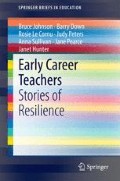Abstract
Relationships refers to the social and professional networks, human connections and sense of belonging experienced by early career teachers. Schools that value relationships focus on the complex emotional needs of early career teachers and encourage social exchanges that foster respect, trust, care and integrity. Early career teacher resilience benefits significantly when these values are evident in policies and practice.
Access this chapter
Tax calculation will be finalised at checkout
Purchases are for personal use only
References
Aultman, L. P., Williams-Johnson, M. R., & Schutz, P. A. (2009). Boundary dilemmas in teacher–student relationships: Struggling with ‘the line’. Teaching and Teacher Education, 25, 636–646.
Barth, R. (2006). Relationships within the schoolhouse. Educational Leadership, 63(6), 8–13.
Berthelsen, D., & Walker, S. (2008). Parents’ involvement in their children’s education. Family Matters, 79, 34–41.
Bryk, A., & Schneider, B. (2002). Trust in schools: A core resource for improvement. New York: Russell Sage Foundation.
Cantrell, G. G., & Cantrell, G. L. (2005). Teachers teaching teachers: Wit, wisdom, and whimsy for troubled times. New York: Peter Lang.
Cochran-Smith, M., & Paris, C. (1995). Mentor and mentoring: Did Homer have it right? In J. Smyth (Ed.), Critical discourses on teacher development (pp. 181–201). New York: Cassell.
Crawford, M. (2009). Emotional coherence in primary school headship. Educational Management Administration and Leadership, 35(4), 521–534.
Darling-Hammond, L. (2003). Keeping good teachers: Why it matters, what leaders can do. Educational Leadership, 60(8), 6–13.
Department of Education and Children’s Services. (2010). South Australian teaching for effective learning. Adelaide: Government of SA.
Ewing, R. A., & Smith, D. L. (2003). Retaining quality beginning teachers in the profession. English Teaching Practice and Critique, 2(1), 15–32.
Flores, M., & Day, C. (2006). Contexts which shape and reshape new teachers’ identities: A multi-perspective study. Teaching and Teacher Education, 22, 219–232.
Garman, N. (1995). The schizophrenic rhetoric of school reform and the effects on teacher development. In J. Smyth (Ed.), Critical discourses on teacher development (pp. 23–33). New York: Cassell.
Gomez, M. L., Allen, A., & Clinton, K. (2004). Cultural modes of care in teaching: A case study of one pre-service secondary teacher. Teaching and Teacher Education, 20, 473–488.
Groundwater-Smith, S., Ewing, R., & Le Cornu, R. (2010). Teaching: Challenges and dilemmas. Melbourne: Cengage.
Gu, Q., & Day, C. (2007). Teachers resilience: A necessary condition for effectiveness. Teaching and Teacher Education, 23, 1302–1316.
Hammerness, K., Darling-Hammond, L., Bransford, J., Berliner, D., Cochran-Smith, M., McDonald, M., et al. (2005). How teachers learn and develop. In L. Darling-Hammond & J. Bransford (Eds.), Preparing teachers for a changing world: What teachers should learn and be able to do (pp. 358–389). San Francisco: Jossey-Bass.
Hammond, S. (1998). The thin book of appreciative inquiry (2nd ed.). Plano, TX: Thin Book Publishing.
Isenbarger, L., & Zembylas, M. (2006). The emotional labour of caring in teaching. Teaching and Teacher Education, 22, 120–134.
Kitching, K., Morgan, M., & O’Leary, M. (2009). It’s the little things: Exploring the importance of commonplace events for early-career teachers’ motivation. Teachers and Teaching: Theory and Practice, 15(1), 43–58.
Korthagen, F. (2004). In search of the essence of a good teacher: Towards a more holistic approach in teacher education. Teaching and Teacher Education, 20, 77–97.
Manuel, J. (2003). ‘Such are the ambitions of youth’: Exploring issues of retention and attrition of early career teachers in New South Wales. Asia-Pacific Journal of Teacher Education, 31(2), 140–151.
McBride, M. C., & Wahl, S. T. (2005). ‘‘To say or not to say?’’ teachers’ management of privacy boundaries in the classroom. Texas Speech Communication Journal, 30, 8–22.
McCormack, A., Gore, J., & Thomas, K. (2006). Early career teacher professional learning. Asia-Pacific Journal of Teacher Education, 34(1), 95–113.
Muller, C., Katz, S. R., & Dance, L. J. (1999). Investing in teaching and learning dynamics of the teacher-student relationship from each actor’s perspective. Urban Education, 34(3), 292–337.
Nieto, S. (2003). What keeps teachers going?. New York: Teachers College Press.
O’Connor, K. E. (2008). ‘You choose to care’: Teachers, emotions and professional identity. Teaching and Teacher Education, 24, 117–126.
Otero, G. G., & Chambers-Otero, S. (2000). RelationaLearning: Towards a human ecology in 21st century schools. Jolimont: Incorporated Association of Registered Teachers of Victoria.
Preskill, S., & Brookfield, S. (2009). Learning as a way of leading. San Francisco: Jossey-Bass.
Thayer-Bacon, B. (2004). Personal and social relations in education. In C. Bingham & A. Sidorkin (Eds.), No education without relation (pp. 165–179). New York: Peter Lang.
Warren, M. (2005). Communities and schools: A new view of urban school reform. Harvard Educational Review, 75(2), 133–173.
Author information
Authors and Affiliations
Corresponding author
Rights and permissions
Copyright information
© 2015 The Author(s)
About this chapter
Cite this chapter
Johnson, B. et al. (2015). Relationships. In: Early Career Teachers. SpringerBriefs in Education. Springer, Singapore. https://doi.org/10.1007/978-981-287-173-2_5
Download citation
DOI: https://doi.org/10.1007/978-981-287-173-2_5
Published:
Publisher Name: Springer, Singapore
Print ISBN: 978-981-287-172-5
Online ISBN: 978-981-287-173-2
eBook Packages: Humanities, Social Sciences and LawEducation (R0)

